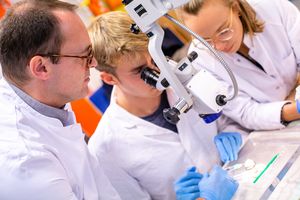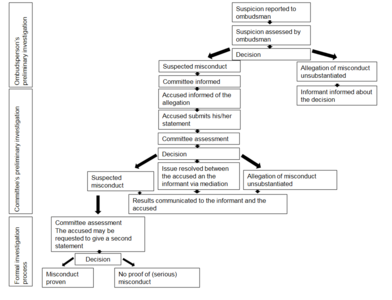„Academic misconduct, in whatever shape or form, violates both the image and credibility of science. Not only does it damage the reputation of the dishonest researcher, but it also tarnishes the reputation of the University and science as a whole. It also casts doubts on the work of other scientists.“[4]
Labor and service law consequences
Depending on the employment type, different consequences can be considered.
If the person concerned is employed by the University, the disciplinary actions, such as reprimand, warnings, extraordinary termination, regular termination or termination of contract can be considered.
If the person, who conducted the academic misconduct, is employed by the University in an official role, disciplinary actions may result in reprimand, fine, pay cut, retraction of the appointment and other disciplinary measures. [5]
Civil and public actions
„The following civil and public actions are particularly relevant in the event of academic misconduct:
- Revocation or cancellation of grant decisions, revocation of approved funding or recovery of funding which has already been spent
- A ban on entering the University
- Enforcement and, where appropriate, execution of the right to recover possessions against the person concerned, in particular with regard to stolen materials, documents or data
- Claims for abatement or removal or injunctive relief arising from copyright law, personal rights, patent law and competition law
- Damage claims on the part of the Carl von Ossietzky University or third parties in the event of personal damage, property damage or any other violation of rights
- Disqualification of examination results” [6]
Academic consequeces
As a consequence of academic misconduct it might be considered to revoke the obtained academic degree. „The revocation of an academic degree (Bachelor’s or Master’s degree, the former German Diploma and Magister degrees, Dr. habil.) or academic titles (lecturer, adjunct professor) will be considered if the academic degree or academic title was achieved based on falsified publications or was otherwise fraudulently obtained.” [7]
Another possible consequnce of academic misconduct is the retraction of scientific publications. „If the academic misconduct concerns false information or an infringement of intellectual property or involvement in such misconduct, the author in question must issue a retraction, at least for the affected parts of the publication. If the work in question is still unpublished, the author in question must retract their paper or contribution to the paper in good time.” [8]
Criminal actions and administrative offences
„Criminal and administrative actions in the event of academic misconduct are applicable if there is sufficient evidence (initial suspicion) that a criminal act has taken place in accordance with the Criminal Code (StGB), the Administrative Offences Act (OWiG) or other laws” [6]


